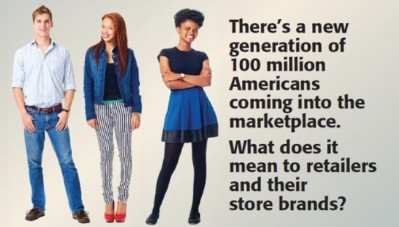Interview with John Eldridge, 30-year CPG industry vet and Guiding Stars strategy consultant
Don’t underestimate Millennials’ influence on the consumer landscape

But what really makes them different, and why should marketers care? Thirty-year CPG industry vet and strategy consultant at nutritional rating firm Guiding Stars Licensing Co., John Eldridge, told FoodNavigator-USA that as much as the industry has studied this authenticity-minded, plugged-in generation, it will continue to surprise.
“When a new generation comes along, we as an overall group of business people and experts have a natural tendency to underestimate the influence of emerging generations,” Eldridge said. “I think Millennials are going to surprise us in ways we’re really not anticipating. Some of that will have to do with their outlook, attitudes and values, some with information technology and the way it keeps evolving so rapidly.”
Less ‘big brand’ awareness, less loyalty
Indeed, a 2014 report from the Hartman Group titled “Outlook on the Millennial Consumer” found that Millennials shop all retail channels and tend to go most often to stores in close proximity. They connect with brands that have good prices, similar values and a personality they can relate to—in particular, one that’s playful or quirky and "gets" their sense of irony.
“Generally speaking, Millennials are certainly less conscious of traditional brands and less loyal,” Eldridge said, responding to the Hartman Group study. “They’re probably a little more tuned into emerging brands or brands that have personality.”
The generation also leads the way in seeking out natural and organic ingredients, products that are locally grown and made and are free of GMOs and allergens—a trend Eldridge says will likely continue. “To the extent that manufacturers really want to resonate with Millennial shoppers, they need to continue to emphasize natural, organic and clean ingredients in at least part of their portfolios.”
Because Millennials came of age during a time of proliferating technology and mobility, both are instrumental in how they get information and operate, Eldridge said. He pointed out that they’re more inclined than previous generations to use mobile apps before and during shopping trips, and more prone to share information about products socially with peer groups.
But instant access to so much information can have its downside, too—more specifically, an erosion of consumer trust when it comes to marketing claims.
“Millennials are very tuned into doing rapid research on products, trends and services they’re interested in. They’re able to gather more information and debunk things, if you will, much more quickly than past generations could or would. Because of that, they're more immediately aware of how claims about products can be unsubstantiated and they have more inherent suspicion than Baby Boomers and seniors.”
This increased interest in investigating ingredients has benefitted third party-verified programs like Guiding Stars, which rates the nutritional quality of more than 100,000 foods using information from the Nutrition Facts panel and ingredient list. Since its launch in 2008, the program has expanded to upwards of 2,000 retailers across North America and nearly 30 foodservice programs.
“The program is evidenced-based so it can’t be influenced by the manufacturer, which resonates with the inherently suspicious Millennial consumer,” Eldridge noted.
Indeed, the tendency to mistrust brands and their motives (coupled with an apparent willingness to “shop around” more often) is forcing some manufacturers to retool their strategy to be more transparent and authentic, as was the case with General Mills’ recent backtracking on its online legal policy (see here).
“Manufacturers have an interesting challenge and opportunity ahead,” Eldridge said. “I think the ones that are going to have more of a presence and be more successful among Millennials are those that find ways to create relevant stories and causes around their brands. It's a totally different way of communicating with the consumer. It's more about content and creating interesting, engaging stories that lead people to the brand but don’t put the brand front and center. They also need to be careful about not making unsubstantiated or self-serving claims. They absolutely need to be transparent and authentic.”
Delivery format almost more crucial than information itself
It’s for that reason that Eldridge says retailers have a somewhat easier challenge when it comes to Millennials, as they tend to be viewed as more of an arbiter between brand and consumer—or at the very least, less self-serving.
“They’re perceived to be more of an independent third-party provider of foods and services, and they’re community based,” he said. “Nonetheless, they have to be thinking about how they can engage Millennials and provide information that goes beyond the store environment itself, with information not only about their retail banner or brand, but also about trends, products and services Millennials are interested in—and most importantly, into online and mobile formats that work. That’s where they will get information before they ever land in the store.”

















